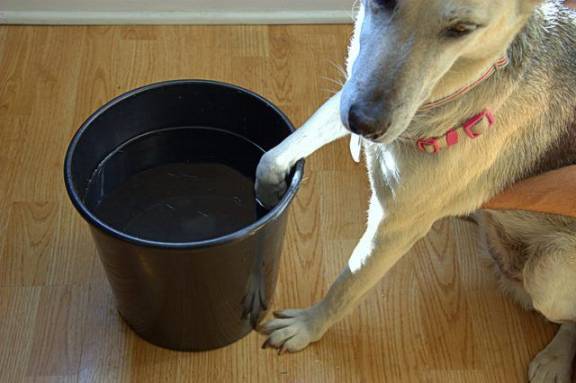Just like us, our canine fur babies can develop and suffer from food allergies! Dogs can, and frequently do, develop allergies to food substances, even dog food that contains the best ingredients. If your pup seems to be itchy, he could be suffering from a food allergy.
Connect with a verified veterinarian in minutes. Licensed vets are available 24/7 to answer your questions. No need to worry about your furry family member.
Dog Food Allergy Symptoms
Food allergies in dogs have various symptoms. A dog allergic to food ingredients may experience some of the following allergy symptoms, including:
- Itchy/scratchy skin: this may be near his ears, mouth, nose, paws, rear end or on his stomach. This condition is known as allergic dermatitis and is quite uncomfortable. Dogs may even shed more.
- Hives: itchy, raised red bumps, hives (also called urticaria) can be a sign of a dangerous allergic reaction. They may not show up immediately but can become apparent 6 to 24 hours after your dog eats the allergen. Dogs with urticaria will experience frantic itchiness and may bite, claw and lick the affected areas. Left untreated, hives can go on to become a severe allergic reaction. Not only that, but the frantic scratching and biting could also lead to a skin infection and/or severe hair loss.
- Gastro-intestinal problems: food allergies can cause gut troubles, including gas, vomiting and diarrhea.
- Swollen face: another sign of a severe allergic reaction is swelling your pup’s face, lips, eyelids or even his ears.
- Red, itchy runny eyes: your pup can develop this symptom not only from food allergies, but from other substances he may be allergic to. This symptom may also be accompanied by eye discharge—mucus coming from his eyes.
- Chronic infections in ears and paws: these infections, which don’t seem to clear up with treatment, may be signs that your dog has a food allergy.
- Coughing & breathing difficulties: these are also common in dogs with food allergies; in fact, a dog can even develop asthma from food allergies.
Anaphylaxis in Dogs
Dogs can have severe allergic reactions, also called anaphylaxis. This is a dangerous condition which may happen immediately after exposure to an allergen. A severe allergic reaction can be caused by any substance, not only those that are most common. It just depends on the dog’s immune system and what substances he’s been sensitized to. The most common causes of anaphylaxis are bug bites, food proteins, medications, environmental pollution and exposure to chemicals.
This is a dangerous, life-threatening reaction. If your dog shows signs of anaphylaxis, then you’ll need to get him to the vet as soon as possible for treatment.
Anaphylaxis may begin as a regular allergic reaction; however, it will quickly develop into a life-threatening problem. You may notice your dog’s face (or another body part) starts to swell, he may drool and/or vomit, have diarrhea, and even have difficulty breathing. If you notice a bluish color to his gums or tongue, this is a life-threatening reaction and he needs treatment ASAP.

Review symptoms, medications & behavior to keep your pets healthy with a Vet Online in just minutes.
Ask a Vet Live NowDifference Between Food Allergy and Food Intolerance
You’ve probably heard there’s a difference between a food allergy and food intolerance. This is the case for both dogs and their pet parents. But what is the difference? A food allergy is the immune system’s response to a substance it sees as a foreign invader. The immune system is supposed to protect your pup from infections and other nasties. However, a dog with an allergy has an immune system that overreacts to substances that are usually non-threatening. The substance may a protein found in wheat, or corn or chicken. The problem substance varies from dog-to-dog. No dog’s allergies are exactly as another dog’s. When the immune system detects this normally safe substance, it produces histamines to stop the perceived attack. This is what causes the allergic symptoms you may notice (as described above).
On the other hand, a food intolerance has nothing to do with the overactive immune system. A food intolerance may show some similar symptoms. However, the body’s response is due to the body being unable to process a specific ingredient that may be in your dog’s food. Milk can be an offender, as some dogs are lactose intolerant. Food intolerances are more common than food allergies.
Most Common Food Allergens in Dogs
You’ll be surprised by some of the ingredients found in this list—some of the most common food allergens in dogs:
- Beef
- Chicken
- Egg
- Dairy products
- Corn
- Wheat
- Soy
- Rice
- Barley
- Oats
One note—these ingredients are the most often used in commercial dog foods; it’s entirely possible for a dog to become allergic to one or more of these ingredients. It’s not fun to have food that can make you sick like this!
Dog Food Allergy Diagnosis
How are food allergies diagnosed in dogs? You and your vet may suspect your dog has food allergies if he’s showing some of symptoms described in the previous sections. There are a couple of ways your vet may make a diagnosis of food allergies.
1. Corticosteroid response: your vet may prescribe a round of corticosteroids to see if your dog’s symptoms improve. Skin issues, including itchiness, hives, etc. respond quickly to these medications. If symptoms improve, it could mean your dog has a food allergy, or another type of allergy. This may not be a conclusive test.
2. Elimination diet: aside from intradermal allergy tests, amongst others, the only other way to determine if your fur baby has food allergies is with the elimination diet. Your vet may decide to put your dog on a limited diet to help you identify foods that could be causing the allergy. It may be necessary to make a list of all the dog foods your dog has eaten, then compile the ingredients from each food (as best you can tell), the more ingredients you can gather, the easier it may be to pinpoint the offending ingredient(s).
Once you have the list compiled, your vet will work with you to develop the food elimination diet specifically for your dog. You usually start with ingredients your dog has never had. His allergy symptoms may decrease, helping you to determine which ingredients may be causing the problem. You may try this first step for a specific amount of time determined by the vet. If your dog does OK, then the vet may add another ingredient (only one new ingredient at a time). If your dog continues to be OK and his symptoms are improving, then the vet will add another ingredient, and so on.
The elimination diet may take some time; however, it’s one of the best ways to make a diagnosis of food allergies in dogs.
3. Dog food allergy test kit: you can also try an OTC food allergy test kit made especially for dogs: the 5Strands Household Pet Food Allergy Sensitivity & Intolerance Test Kit. This kit tests your pup for over 300 of the most common food and environmental allergies and intolerances. It includes testing for the major proteins, most grains, fruits, vegetables, and even includes the most common trees and grasses. The test is pain-free—you just gather a hair sample (instead of blood), which makes it the most pain-free process for your fur baby. After sending in the hair sample, you’ll receive the results in about 7 to 10 business days. You’ll also receive guidelines on how to treat and prevent your dog’s allergies and intolerances.
Dog Food Allergy Treatment
As noted earlier, the elimination diet may take some time to point out which ingredients your dog is allergic to. Your vet may prescribe a round of corticosteroids to help ease your fur baby’s symptoms during this trial diet. They may also prescribe antihistamines to help with overall symptoms and these can be safely taken with corticosteroid medications.
When you and the vet have determined what your pup’s allergic to, then avoidance is the best treatment. Your dog will have to avoid the ingredient(s) that are causing his symptoms. This may mean you’ll have to find an entirely new diet for your dog, but he will be more than thankful when he starts feeling better again.
Dog Food Allergy Home Remedy
You also have some other options when it comes to treating your fur baby’s food allergies at home. Home remedies may include:
1. Quercetin: this a natural flavonoid found in the skin of fruits and vegetables. This substance acts as both an anti-inflammatory and an antihistamine, both of which are prevalent during an allergic reaction. You might try Zesty Paws Aller-Immune Bites. These doggie bites work to boost your pup’s immune system. These chewy, yummy bites contain a blend of digestive and immune-boosting ingredients that promote a healthy response to food, skin and environmental allergies.
2. Vets Preferred Premium Wild Alaskan Salmon Oil: salmon oil promotes healthy skin and a smooth, shiny coat. It helps ease itching, flaking and drying caused by allergic reactions. This product is produced with only wild, non-farmed salmon fresh-caught in the pure waters of Alaska. It’s all natural, made in the USA in FDA-registered facilities in the USA.
3. Learn to read labels: once you’ve learned what foods your pup’s allergic to, you’ll have to start reading labels on everything he eats—from snacks and treats to his daily dog food. Avoiding these substances is in the only sure remedy to keep your dog’s allergies under control.
4. Control other allergens: chances are if your dog has food allergies, he may also suffer from additional allergies, including to grass, trees and more. To help keep these allergies at bay, you’ll have to find a bathing routine that works for your dog. Maybe he’ll need to be bathed once a week or more to keep these other allergens under control. If your dog mainly has itchy feet, you can try to keep a foot soak bowl or tub near your door. When you and your fur baby come home, dip each of his feet in the basin and then towel dry before entering the house. This way, you’ll clean his feet and keep the allergen down to lower amounts in the home—at the same time.
If your dog has sore, red eyes, you can try dipping a pad of gauze in saline solution and using this to wipe the goop from around his eyes once a day. This can really give him some relief if his eyes are itchy and swollen. Food allergies can make your dog really sick; and chances are your pup may have food allergies plus other types of allergies. If you suspect your fur baby may have allergies of any type, be sure to take him to see the vet for a checkup. Your vet will know how to help your pup feel better and stay healthy, in spite of allergies.
Connect with a verified veterinarian in minutes. Licensed vets are available 24/7 to answer your questions. No need to worry about your furry family member.

Julie
Julie is a graduate of the University of North Carolina, Wilmington, where she studied Animal science. Though contrary to the opinion of her parents she was meant to study pharmacy, but she was in love with animals especially cats. Julie currently works in an animal research institute (NGO) in California and loves spending quality time with her little cat. She has the passion for making research about animals, how they survive, their way of life among others and publishes it. Julie is also happily married with two kids.
Review symptoms, medications & behavior to keep your pets healthy with a Vet Online in just minutes.
Ask a Vet Live Now



